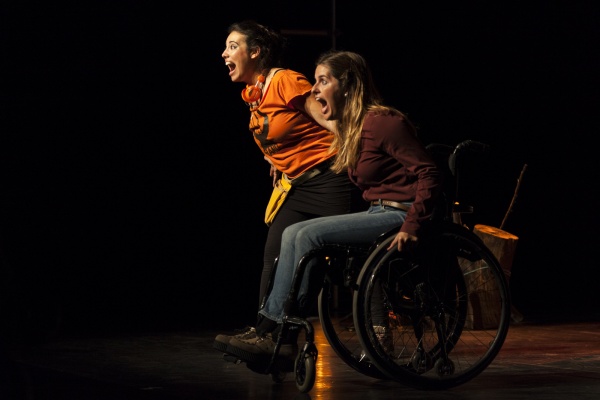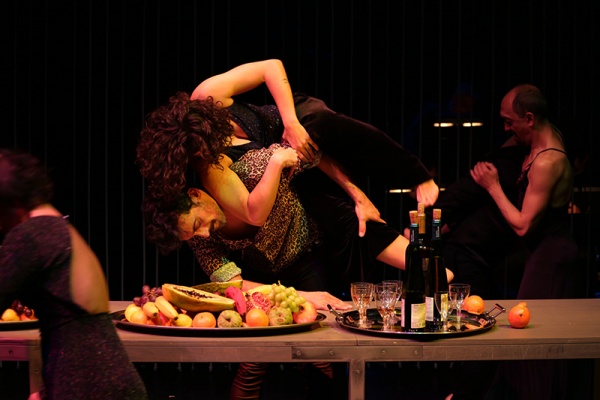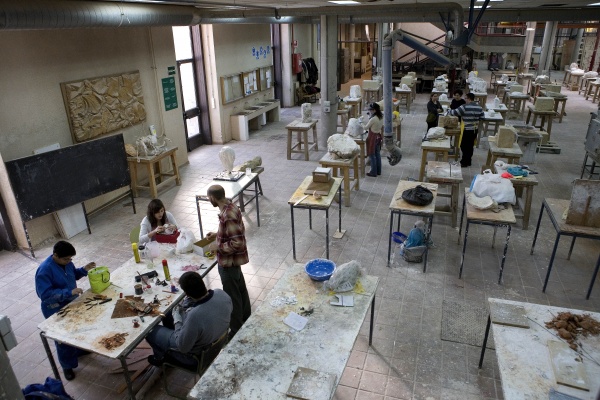In the latest of Disability Arts International’s country profiles, UK-based disabled journalist and theatre-maker, Kate Lovell, explores Spain, a country with a host of disability arts festivals and a federal funding structure.
Political context

In 2003, a law was introduced in Spain aimed at promotingequal opportunities, eradication of discrimination and universal accessibility (Law 51/2003). One of the points of this law urges for greater accessibility of disabled people to arts activities. In 2011, the Spanish government approved a strategic plan to implement Culture for All “Estrategia Integral Española de Cultura para Todos”. Four years later, the National Network of Performing Arts Venues, representing 700 theatres across the country, created a specific department with the aim of galvanizing a more inclusive sector, not only in the main Spanish cities but all over the country, providing more tools to asses venues in relation to touring, accessibility etc.
A Nation of Festivals
A bounty of disability arts and integrated festivals is the mainstay for showcasing work by disabled artists and disability arts companies across Spain. Informed in part by the federal funding structure, inclusive festivals take place across different Spanish states. They are, though, joined-up, with Ines Enciso coordinating this network of festivals.
Enciso is the artistic director of Una mirada diferente, which was established in 2012, taking place at Teatro Valle-Inclán in Madrid: a prestigious platform as the second space for Centro Dramático Nacional. Determined to stay dynamic, in 2019, its seventh year, Una mirada diferente boldly shifts to focus on process over production. This year “the exhibition of shows will not be the main objective of the Festival – we change format, we play, we dare.”
Madrid is also home to La Casa Encendida which hosts Festival Internacional de Artes Escénicas (IDEM) where 2018’s offerings focused on diversity ‘of languages, formats, disciplines, bodies, themes’. Portuguese disabled dance company Dançando com a Diferença presented at IDEM 2018, alongside Diversity Youth Choir, an international, inclusive choral ensemble conducted by José María Álvarez Muñoz. La Casa Encendida itself is a socially engaged place of experimentation, funded by Fundación Montremadrid.
Festival 10 Sentidos, in Valencia, has become a reference point for a cultural shift: a move towards noticing and engaging with disabled artists. As expressed by its artistic director, Meritxell Barberá, the festival focuses on “the binomial art and social action in its programming.” Barberá explains that each year the social discourse in the festival focuses on a different issue through its theme.
“Due to the influence of the Festival 10 Sentidos, other cultural initiatives have emerged in other communities in Spain aiming to give visibility to disability and social exclusion. This makes us feel tremendously proud and we would like to continue this wave of expansion in other communities, and to keep on consolidating it in those where it has already started.”
“The first edition of the Festival 10 Sentidos, eight years ago, defended and focused on disabled artists who worked professionally. In the second edition, we decided to stop announcing their participation to make the message more inclusive. It is not necessary to emphasise the fact that disabled artists take part in the festival. This normalised coexistence is what we want to continue promoting edition after edition.”
Looking to its future, Barberá states, “our aim is to consolidate the festival as the main living arts festival in Valencia, a forerunner for presenting art as the perfect catalyst for social action and extending its impact both nationally and among European festivals.”
Companies

Liant la Troca are an integrated dance collective formed in 2011, working out of the Troca de Roca Umbert space in the city of Granollers, Catalonia. Both disabled and non-disabled dancers meet weekly for a workshop in the studio space. The company have a suite of shows which they have performed variously at festivals and in theatre spaces across Spain.
Danza Mobile also champion the work of disabled dancers, including recently showcasing its company members performing the national dance at the Flamenco Biennale in the Netherlands. Speaking to Danza Mobile, they explain that the company is well-respected in the circuits and festivals of dance and theatre. Danza Mobile’s production, ‘El Festín de los Cuerpos’ premiered at the Madrid International Dance Festival in 2018 and another, ‘En Vano’, in 2017 at the International Festival of Dance Month in Seville. Danza Mobile’s Mercedes Vega Negrete observes “our shows are contracted for their quality, like the rest of the companies. Examples of our success in this respect are our dancer Helliot Baeza, who won the award Escenarios de Sevilla for the Best Dancer in 2018, competing on equal terms with other professional dancers.” Although they feel there has been more openness to programming inclusive shows in recent years, they find it difficult to get disabled artists programmed outside of a festival environment.
Away from the performing arts world, Asociación Debajo del Sombrero is a visual arts organisation, based in Madrid, which provides studios and professional development support for learning-disabled visual artists.
María Sol Álvarez Yenes from Debajo del Sombrero asserts that their main aim is to develop professional artistic careers for learning disabled artists: “to reach the public and to reach art collectors, and to exhibit their artwork. The professional promotion of an artist is a long and complex process. This is our main challenge.”

Debajo del Sombrero are successful in their aim to professionalise learning disabled artists: “We have two artists having national and international exhibitions: Jose Manuel Egea is exhibiting and selling his artwork in the Christian Berst gallery in Paris: a big success for him and for all of us. Andrés Fernández has recently had a magnificent exhibition in an art gallery in Madrid, F2 Gallery, and this year in September there will be an exhibition in the MUSAC, the contemporary art museum of Leon. He also has exhibited in Caixa Forum and Macba.”
Funding Landscape
The Organización Nacional de Ciegos de España(ONCE) is a key organisation for the funding of disability arts activity in Spain. It was established in 1988, with broad aims for improving the lives of disabled people across Spain, including the mission to “promote solidarity and social cohesion articulating activities”, including via the arts. The foundation itself draws the funding it distributes from the lottery, owned by ONCE.
Funding for disability arts in Spain is distinctive in that it is largely awarded on a federal basis, state by state. This complex, somewhat divided funding structure does throw up challenges for a cohesive national movement for disability arts.
There are explosions of activity across Spain, with concerted efforts to draw lines between the various festivals and companies producing work by disabled artists.
This spread across the states does have its advantages in that there is not the problem of a concentration of work all taking place in any one big city, as is the case in the disability arts scene in some other European countries. Furthermore, the fact that festivals are the primary arena for showcasing the work of disabled performance artists may well pave the way for a more diverse audience who are attending the festival and happen upon disabled artists and companies.
The disability arts scene in Spain is youthful and experimental, which brings a dynamism that will power further growth of the sector. Progress for disabled artists in Spain may be slow, across art forms, but the successes of individual artists and companies marks significant progress for disability arts in Spain. The spirit of fearlessness around challenging the status quo in the Spanish arts scene is something that all of us pushing for progress could do with invoking.

